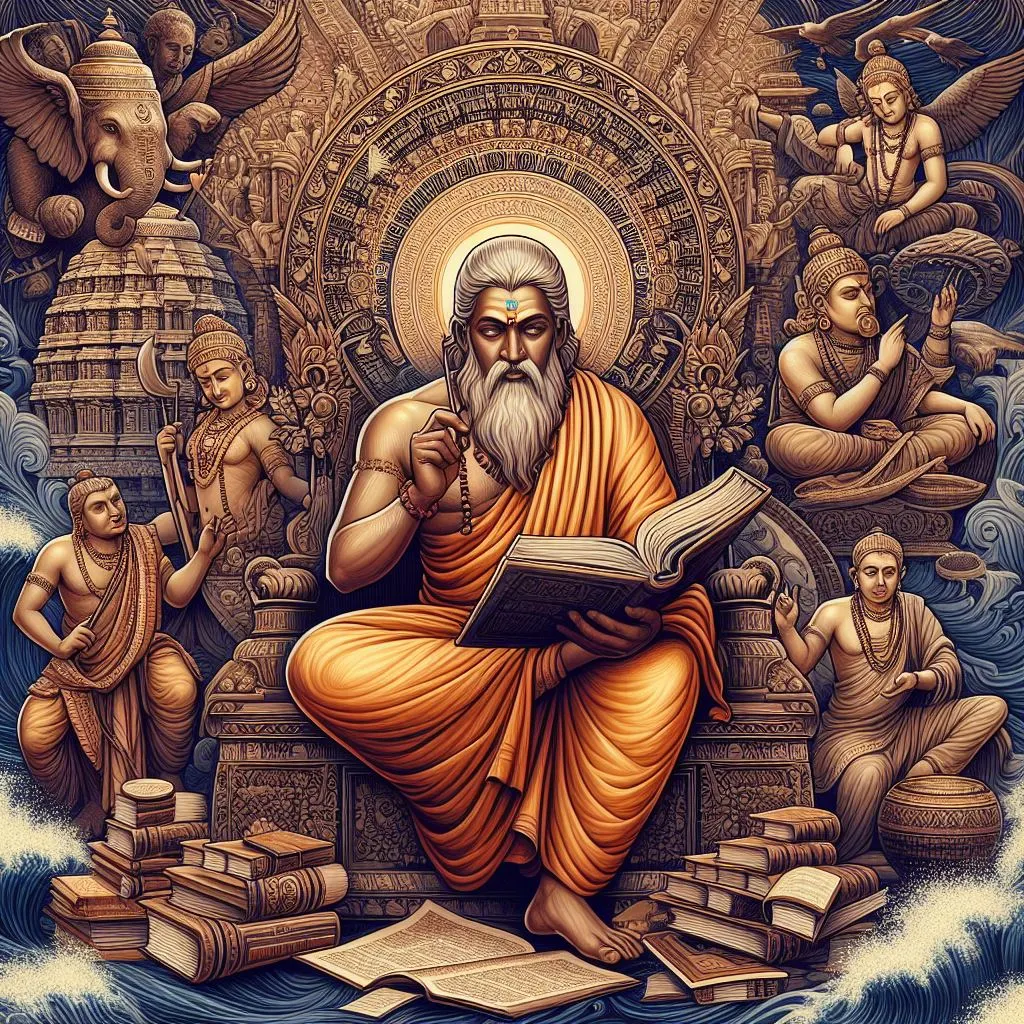Few literary works have transcended time, geography, and culture like the Thirukkural. Written by Thiruvalluvar, this ancient Tamil text is a profound testament to the intellectual and cultural achievements of Tamil civilization. Beyond its philosophical depth, the Thirukkural holds immense historical significance as a cornerstone of Tamil literature and a universal guide for human conduct.
This blog dives into the historical context, importance, and enduring legacy of the Thirukkural, revealing why it remains a cherished masterpiece even today.
Contents
The Origins of Thirukkural
1. Who Was Thiruvalluvar?
Thiruvalluvar, the author of the Thirukkural, is a revered Tamil poet and philosopher whose life remains shrouded in mystery. While exact details about his birth and background are uncertain, historical scholars estimate that he lived between the 1st century BCE and the 5th century CE in present-day Tamil Nadu.
Tradition holds that Thiruvalluvar was a weaver by profession, symbolizing humility and simplicity. His philosophical insights, however, suggest a profound understanding of human nature, society, and ethics, reflecting the wisdom of a scholar deeply immersed in the cultural and intellectual milieu of ancient Tamil society.
2. Historical Context: A Golden Age of Tamil Literature
The Thirukkural emerged during the Sangam era, often considered the golden age of Tamil literature. This period, spanning roughly from 300 BCE to 300 CE, was marked by a flourishing of art, culture, and literature. Tamil poets and scholars composed works that explored themes of love, war, ethics, and governance, often celebrating the cultural richness of Tamil Nadu.
The Thirukkural stands out from other Sangam texts due to its universal approach. While much of the literature of the time focused on Tamil society's specific contexts, the Thirukkural transcended these boundaries, offering teachings relevant to all of humanity.
Structure and Content of Thirukkural
The Thirukkural is a concise text comprising 1,330 couplets (kurals), each packed with wisdom and insight. The work is divided into three sections, reflecting the holistic approach to human life:
- Aram (Virtue): Focuses on ethical living, compassion, and morality.
- Porul (Wealth): Offers guidance on governance, leadership, and the ethical pursuit of wealth.
- Inbam (Love): Explores love, relationships, and the emotional aspects of human life.
Each couplet is structured in two lines, with an economy of words that belies its depth. This brevity and clarity make the Thirukkural accessible yet profound, ensuring its relevance across centuries.
Why Is the Thirukkural Historically Significant?
1. A Mirror of Tamil Society
The Thirukkural offers a glimpse into the societal values, norms, and priorities of ancient Tamil civilization. Its teachings reflect a society deeply committed to ethics, justice, and harmony, showcasing the high intellectual standards of the time.
For instance, the Thirukkural's focus on equality is evident in its rejection of caste discrimination, a radical stance in an era when hierarchical structures were prevalent. The text asserts that virtue, not birth, determines a person's worth, aligning with modern ideals of social justice.
2. A Secular Masterpiece
Unlike many ancient texts tied to specific religions or philosophies, the Thirukkural is refreshingly secular. Thiruvalluvar avoids endorsing any particular religious ideology, instead focusing on universal human values.
This neutrality has allowed the Thirukkural to resonate across cultures and religions, making it a unifying force in Tamil Nadu and beyond. Its secular nature also highlights the inclusivity of Tamil society, emphasizing ethics over dogma.
3. Influence on Tamil Identity
The Thirukkural is often regarded as the crown jewel of Tamil literature, playing a crucial role in shaping Tamil identity. Its universal teachings, poetic beauty, and historical significance have made it a symbol of Tamil culture and pride.
During colonial rule, the Thirukkural became a rallying point for Tamil nationalists seeking to assert their linguistic and cultural heritage. Its verses, emphasizing justice and virtue, inspired leaders fighting for freedom and equality.
Global Impact of Thirukkural
The Thirukkural's significance extends far beyond Tamil Nadu. Its universal themes have attracted admirers across the globe, and the text has been translated into over 80 languages, including English, French, German, and Russian.
1. European Interest
European scholars first encountered the Thirukkural in the 17th century through Jesuit missionaries. Fascinated by its philosophical depth, they began translating it into European languages. The first Latin translation by Constanzo Beschi (1730) paved the way for widespread recognition of the text in the West.
Renowned figures like Albert Schweitzer praised the Thirukkural for its ethical insights, comparing it to the teachings of Socrates, Confucius, and Jesus.
2. A Guide for Modern Leaders
The Thirukkural's teachings on governance and leadership remain relevant in the modern era. Its emphasis on justice, accountability, and compassion offers timeless guidance for political leaders and administrators.
For instance:
- “Kodaiyudamai ilvan thalai koduthu attraan
nilaiyudamai vendharkku oli” – A ruler who is unyielding in justice is the light of the kingdom.
Cultural and Literary Legacy
1. Thirukkural in Modern Tamil Literature
The Thirukkural continues to inspire Tamil writers, poets, and scholars, serving as a foundation for countless literary works. Its influence is evident in Tamil cinema, where its verses often feature in dialogues, songs, and narratives to emphasize moral themes.
2. Commemoration of Thiruvalluvar
Thiruvalluvar's legacy is celebrated worldwide through monuments, including the towering Thiruvalluvar Statue in Kanyakumari, which symbolizes his towering intellect and enduring influence. Tamil Nadu also observes Thiruvalluvar Day annually, reflecting his central role in Tamil culture.
Lessons from Thirukkural for Modern Society
Despite being written over two millennia ago, the Thirukkural offers valuable lessons for the 21st century:
- Equality: Its advocacy for equality aligns with modern movements for social justice.
- Sustainability: Thiruvalluvar’s emphasis on moderation and balance resonates with calls for sustainable living.
- Ethics in Governance: The principles of ethical leadership are relevant in a world grappling with political corruption.
- Compassion and Empathy: The Thirukkural's teachings on compassion provide guidance for navigating personal and societal relationships.
Final Thoughts
The Thirukkural is not just an ancient text but a living document that continues to inspire and guide humanity. Its historical significance lies not only in its reflection of Tamil culture but also in its universal appeal and timeless wisdom.
As we uncover its historical context and appreciate its literary brilliance, the Thirukkural reminds us of the enduring power of words to shape societies and transform lives. Whether as a cultural symbol or a guide to ethical living, the Thirukkural remains an invaluable treasure for humanity.






